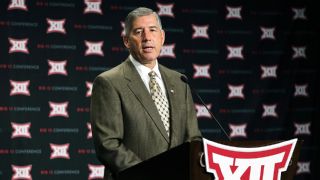|
DALLAS -- Big 12 commissioner Bob Bowlsby says "cheating pays" in the NCAA these days and doesn't foresee things getting much better in the future. During his annual state-of-the-league address from Big 12 media days Monday, Bowlsby slammed the NCAA, notably the enforcement wing of college sports' governing body.  "Enforcement is broken," he said. "The infractions committee hasn't had [an FBS] hearing in almost a year, and I think it's not an understatement to say cheating pays presently. If you seek to conspire to certainly bend the rules, you can do it successfully and probably not get caught in most occasions." Bowlsby added that he didn't think cheating was necessarily rampant in college sports. But he painted a bleak outlook for the future NCAA. "We certainly are operating in a strange environment in that we have lawsuits," he said, "plus we have the [O'Bannon v. NCAA] lawsuit. I think all of that in the end will cause programs to be eliminated. I think you'll see men's Olympic sports go away as a result of the new funding challenges that are coming down the pipe. I think there may be tension among and between sports on campus and institutions that have different resources. It's really unknown what the outcomes will be." Oklahoma State coach Mike Gundy, speaking at the Big 12 media event to ESPN's Joe Schad, didn't disagree with Bowlsby. "I am convinced there are teams that are cheating that are saying, 'Catch me if you can,'" Gundy said. Gundy said head coaches need to be held responsible. "If I have a coach blatantly cheating, they know they'll be dismissed," Gundy said. Bowlsby, however, came to the defense of the collegiate model, which has come under criticism. He argued against the unionization of college athletes, noting that in his opinion, "student-athletes are not employees." He also said it wouldn't be fair to pay football players but not female student-athletes and student-athletes in sports other than football and men's basketball. "It is hard to justify paying student-athletes in football and men's basketball and not recognizing the significant effort that swimmers and wrestlers and lacrosse players and track athletes all put in," he said. "Football and basketball players don't work any harder than anybody else; they just happen to have the blessing of an adoring public who is willing to pay for the tickets and willing to buy the products on television that come with the high visibility. "We have both a legal obligation and a moral obligation to do for female student-athletes and male Olympic sports athletes just exactly what we do for football and basketball student-athletes. I don't think it's even debatable."
|
